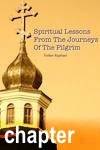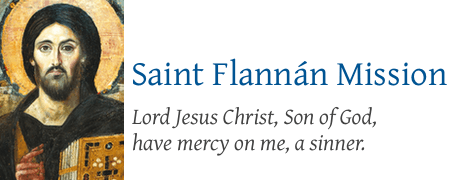 Since there are no coincidences in life, even relationships, do we acknowledge God’s sovereign will in all things?
Since there are no coincidences in life, even relationships, do we acknowledge God’s sovereign will in all things?
Dear beloved,
The pilgrim recounted to his spiritual father, that earlier on, he was hoping to visit the holy city of Jerusalem. He met a friend, who insisted that the pilgrim travel along with an elderly kind gentleman who was quite deaf. The pilgrim at first resisted this offer, because he liked being alone and traveling alone. However, his friend persuaded him that the elderly gentleman would not talk much, and it is unsafe for an old man to travel along a long journey alone. The friend pleaded with the pilgrim for kindness to another fellow being. Finally, the pilgrim agreed.
The pilgrim’s spiritual father also commented that in life, there are no coincidences. God has known every one of us before we were born, and He knows exactly what will happen in our lives. He truly is omnipotent and omniscient, for He is the Creator, Lord, and God. Just the other day, my colleagues in the office found that Humans have several blood types, and animals too, have unique blood types, distinct from every other species of animals. Surely such a complex pattern of life is no coincidence or some random event, but speaks of the amazing complexity and sensitivity of God’s creation.
The spiritual father was very curious about the pilgrim’s journey. However, the pilgrim admitted to his spiritual father that he has forgotten quite many events in his journey, because he would rather focus on the prayer of the heart (Philippians 3:13). The pilgrim recounted that his reposed starets of blessed memory, told him that the evil one would either cause us misery and suffering if we attempt to pray, or if that does not work on us, he would indulge us in pleasant thoughts to distract us from the prayer of the heart. Such spiritual deceptions are the most insidious, and we must always guard against the devil’s prelest to prevent sinking into what I consider an endless loop of meaningless “pleasantness”, which springs from our own selfish pride, vainglory and greed.
The pilgrim was in need of dried bread when he traveled through the Tobolsk province, and some locals were warm to him, and gave him fresh bread for a whole week, and even gave him a new backpack to replace his broken one.
Later on, the pilgrim met another family, which insisted that the pilgrim rest and eat with them. The master of the house was a judge, and his wife insisted that he stay to chat with her husband. The mistress’ mother was a schema nun in Tobolsk and she hoped the pilgrim, while heading back to Irkutsk, would visit the old nun and give her a book of Saint John of the Ladder as a favor. The pilgrim then had dinner with the family and found the family to be pious and good Christians with much respect for everyone, including their helpers. The pilgrim politely asked how the family was so spiritual and kind.
The mistress told the pilgrim that her mother, the schema nun, was the great granddaughter of Saint Joasaph. Their family rented part of their house to a poor nobleman and his family. When the nobleman died, his wife was already pregnant. When the nobleman’s wife delivered the baby boy, she died as well. The nobleman’s son came into the world an orphan. The mistress’ mother adopted the baby boy and raised him as her own. Subsequently the mistress was born a year later. The two kids grew up and studied together, and eventually, the two of them were married, and the mistress’ mother blessed both of them, asked both of them to be faithful and kind Christians to help others, gave the whole estate to both of them, and retired to a monastery as a nun.
The pilgrim sat with the judge in his study and found the study to be a paradise, full of beautiful icons, a life-sized crucifix, Bibles and many books. Both of them sat down to read about prayer together. They focused on the Lord’s Prayer (Our Father), which the pilgrim said was the most precious prayer because it came straight from our Lord Jesus Christ.
For many of us, the Lord’s Prayer, as with many other liturgical prayers, become but prayers mechanically prayed during liturgies or the daily rule. But do we discern quietly, visit our inner hearts, and feel the Lord’s Prayer deep within, and reflect on it with reverence? Have we lost the innocence of a prayerful child so desired by God our Father (St Matthew 18:3)?
In the Philokalia, mentioned by the Pilgrim to the judge and his wife, he recalled that Saint Maximus the Confessor and Saint Peter of Damascus said that the Lord’s Prayer, “Our Father…” asked us to treat others as our own family members, because all of us are truly the children of God. And the verse “Hallowed by Thy Name” reminds us to always take the Name of our Lord in reverence, fear and trembling, and not used it on false oaths. “Thy Kingdom come” reminds us that we can find His kingdom right in our hearts, a tranquil joy found only in the prayer of the heart.
The “daily bread” refers to the Word of God, the very food we need for spiritual fulfillment. Since it is a daily food, it should be consumed regularly (like how many would eat several meals a day), and not taken lightly to read only occasionally. And the Lord’s Prayer reminds us to always forgive the sins of others even as we dare to approach God to forgive our many uncountable sins (1 John 1:9). It is important to note that forgiveness is not just an outward verbal expression out of arrogance, but it must come from within as a complete surrender to God’s will, to believe God is the only fair judge and the final arbiter of all things, not us (Ephesians 4:32). It also means that to forgive others is to not even have pre-judgment against others, to not view others as any different from us, whatever their race, state of being, situation, wealth, affiliation, and so on (St Luke 6:35). And in the many challenges and trials we face in life, we ask for God’s Divine mercy to envelop us, and allow us the mercy to always have the Holy Spirit deep within us, pricking our conscience, opening our hearts to know the many distractions and temptations of the evil one to avoid them.
Let us pray the Lord’s Prayer:
“Our Father, Who art in the heavens, hallowed be Thy name. Thy kingdom come, Thy will be done, on earth as it is in heaven. Give us this day our daily bread, and forgive our debts, as we forgive our debtors. And lead us not into temptation, but deliver us from the evil-one. For Thine is the kingdom, and the power, and the glory, forever and ever. Amen”.
Let us also remember the prayer of the heart, and let it be like our breathing, our every step, every moment in a day:
“Lord Jesus Christ, Son of God, have mercy on me, a sinner.”
Book Index | Prev: Divine signposts | Next: Washing others’ feet
